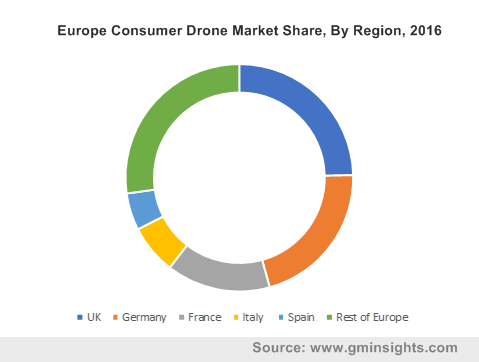A quick overview of consumer drone market in terms of the application landscape, global industry to register a double-digit CAGR over 2017-2024
Publisher : Fractovia | Published Date : 2018-04-13Request Sample
The latest pact between reputed biggies, DJI, 3DR, and GoPro, is indicative of the efforts consumer drone market players have been undertaking in order to establish a cohesive drone traffic management system. Amidst a scenario where UAV security is constantly under the scanner, the aforementioned companies, including the world’s largest drone company, seem to have gone an extra mile to provide insights about consumer drone industry. These firms have created the ‘Alliance for Drone Innovation’ that would be working with the Federal Aviation Administration and the Congress to form a framework for regulating national airspace.
U.S. Consumer Drone Market Volume Share, By Product, 2016

The incredible advancements in the tech space have indeed been a major driving force for consumer drone market growth. Unmanned aerial vehicles have been used for military and meteorological purposes for long but have witnessed a surging demand in the recent years. This progress can be attributed not only to compactness of size, but also to the increasing deployment of drones in a plethora of application sectors such as videography, journalism, crime fighting, and search and rescue operations. A brief outline of two pivotal applications of consumer drone industry is enumerated in the paragraphs below, that may provide a better insight into the current dynamics of this business space.
Hobbyists taking the consumer drone market by storm
The presence of social media has substantially propelled consumer drone market, given the extensive deployment of the product for what netizens claim as ‘dronie’ – the supposed next big thing in the social media circuit. ‘Dronie’ is seen as an upgrade of the selfie and is captured by the drone several hundred feet above one’s head. With a considerable upsurge in the sales of drones that can carry an iPhone or a smartphone, consumer drone industry has been registering commendable growth in the last few years.
Some drones are being designed with technology that follows the subject with the help of sensors and perpetually hovers over the subject’s head. The social media has also created a generation of exhibitionist consumers who want to record every event they attend. Drones have created the scope for capturing these events form a bird’s eye viewpoint, naturally becoming a popular videography choice for recording weddings, family picnics or music concerts. This trend has now been robustly catching up all over, subsequently stimulating consumer drone industry outlook.
The rise of drone photography is also urging a new type of citizen journalism that uses a drone to fly over an affected area without causing any risk to the operator. As the consumer UAV industry gains maturity in the ensuing years, drones are expected to revolutionize journalism with advanced video footage of warzones or contaminated areas.
A pivotal mention here would need to be attributed to the evolving tourist preferences that are playing their part to impel consumer drone industry share. This is on account of the immersive first-person view (FPV) drones that capture images and directly project them on goggles worn by users. Contributing their bit toward taking tourism to a level that was only possible with helicopters, these drones have been gaining extensive popularity, catapulting consumer drone market to great heights.
Consumer UAV market trends from prosumers
Prosumers – professionals who buy technologically advanced drones with more functional uses in mind, will be a major driving force for consumer drone industry. Prosumers basically buy drones with commercial, civil or governmental purposes in mind. Consequently, they prefer drones with high quality and functionality but without the hardware complications that require a professional’s help. For instance, the French drone maker, Parrot, with the fusion of its commercial and consumer grade drone technology, launched new drones that could be used for construction and agricultural purposes by ordinary consumers.
A major advantage of drones used by prosumers is that they are priced midway between simple hobby drones and highly professional drones. According to analyst viewpoints, this advantageous pricing pattern is certain to add to the growth of consumer UAV market from prosumers.
Technological advancements to propel consumer drone market trends
The oncoming decades are expected to be heavily characterized by technological advancements that will drive consumer drone market outlook. Industry experts predict increased developments in the fields of obstacle avoidance, unmanned traffic management, ease of control and artificial intelligence. Indeed, the rising number of these innovations are certain to enable relaxation in manual control and planning while addressing concerns regarding safety, security and privacy. In consequence, this would have a highly lucrative impact on the overall consumer drone market share.
Recently, DJI, the consumer drone industry behemoth, launched two novel products at an event in California. While one of them was a thermal imaging sensor called Zenmuse XT2, the other one was an advanced development kit that would enable consumers to modify their drones with sensors, payloads, and other customized parts.
In the years to come, consumer drone market will witness intense competition, as major players from myriad other industries will also join the bandwagon to establish themselves in this space. Even currently, the competitive landscape of consumer drone industry is almost cluttered, with hundreds of startups and manufacturers of both hardware and software ruling the vertical. By 2024 however, the increasing number of mergers and acquisitions is expected to severely consolidate this vertical. Furthermore, tech giants such as Google, Facebook, and Intel will continue to conduct advanced research and development programs that would reshape consumer drone market dynamics. Driven by the robust product demand across numerous sectors and the proactive participation of companies, consumer UAV industry size is expected to surpass $9 billion by 2024.